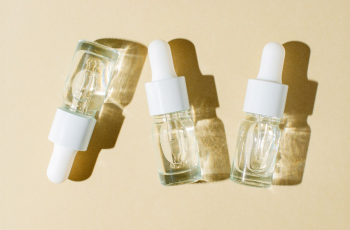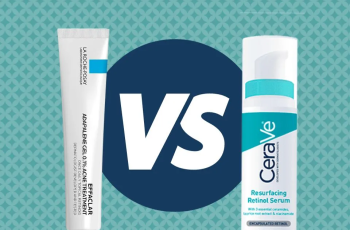
We’re finally seeing the first signs of spring, and with them come changes. I’m not just talking about longer nights or flowers blooming everywhere—I’m talking about skin care.
The change of seasons is a critical time for your skin, as warmer temperatures and longer days change UV exposure, humidity, and pollen levels—all of which can affect your complexion.
To help you make this transition, I spoke to leading dermatologists and skin-care experts about what to look for this spring, from the newest must-have ingredients to simple product swaps to adapt your routine to the season.
Allergy-Free Skin
For many of us, the joy of bright spring days is marred by itchy eyes, runny noses, and rosacea. Yes, it’s allergy season.
“Allergies play a big role in skin irritation this time of year,” says Dr. Shereene Idriss, board-certified dermatologist and founder of Dr. Idriss Skincare.
“Pollen in the air can trigger inflammation and redness, especially for those with sensitive or reactive skin.” Indeed Labs dermatologist Dr Nowell Solish agrees that allergy-related irritation often comes with unpredictable weather:
“Temperature fluctuations can often lead to dryness and dehydration, leaving skin feeling tight and flaky.” With this in mind, it’s important to choose a routine that strengthens the skin barrier, prevents dehydration and speeds up the healing of irritation.
Dr Solish recommends using ceramides (which act like glue between skin cells, keeping skin supple) and peptides (essentially proteins) to support skin’s elasticity come spring.
Try Ole Henriksen Strength Training Peptide Boosting Moisturiser (£42), Paula’s Choice Collagen Peptide Volumising Gel Moisturiser (£49) or Merit Great Skin Peptide Firming Moisturiser (£34).
Weightless Moisturisation
If there’s one woman who can correctly assess our collective skincare needs, it’s aesthetician and Skin Rocks founder Caroline Hirons. “Spring always brings a trend towards lighter textures, but I think this year we’ll see more demand for moisturisers that don’t compromise on effectiveness,” she says.
“Think lightweight but effective formulas like hydrating toners, serums and gel moisturisers that support the skin barrier but don’t act like a blanket over the skin.”
This is the influence of Korean beauty, explains Natasha Hulme, trend expert at SEENWorks. “It helps create the look of radiant skin, which is best achieved with a fine, deeply penetrating layer of hydration, rather than a single layer of heavy occlusive cream,” she says.
“Emulsions have a particularly calming, sensual effect that will be welcomed by dry and sensitive skin types.”
The Ordinary’s Multi-Active Delivery Essence (£10.60) nourishes and prepares the skin for maximum hydration, while Rhode Glazing Milk (£32) strengthens the skin barrier – the outermost layer of the skin that seals in the good stuff (like water) and keeps out the bad stuff (like bacteria).
For hydration and brightening, we recommend Dr. Major Fade Moisturizer. Idris (£60); This lightweight, hydrating gel is enriched with vitamin C.
The rise of polyhydroxy acids (also known as PHAs)
As spring arrives, we gravitate more towards light-makeup formulas and with it our desire for naturally glowing skin. Exfoliating acids such as AHAs (e.g. glycolic acid) are ideal for creating a radiant complexion, but they are not always well tolerated.
If you have sensitive skin, or if you overdo it, AHAs can damage the skin barrier and cause redness and irritation. This is where polyhydroxy acids (also known as PHAs) come into play.
Because their molecular structure is larger than other exfoliating acids, PHAs don’t penetrate as deeply into the skin and therefore cause less skin reaction.
Dr Shendy Engelina, dermatologist and clinical director at Dermatica, sees PHAs as one of the next big trends in skin care. As well as gently exfoliating, “their hydrating properties help lock in moisture, while their antioxidant effects support skin repair and promote a healthy, radiant complexion,” she says.
While PHAs aren’t as widely available as AHAs yet, Glow Recipe’s Watermelon Glow PHA + BHA Pore-Tight Toner (£31), The Inkey List Polyhydroxy Acid (PHA) Gentle Exfoliating Toner (£13) and POREfessional Shrink Wrap Overnight AHA+PHA Pore Treatment (£41, £50) are great options.
Multiple sun protection
SPF is important all year round, but as temperatures rise, the need for effective sun protection comes into focus. Dr Angelina says:
“One of the key trends in skin care is the rise of broad-spectrum sunscreens with antioxidants such as vitamins C and E, which not only protect against UV rays but also fight premature ageing and reduce the risk of skin cancer.”
Antioxidants such as vitamin C can be used in the morning to protect the skin from UV rays and free radical damage, thereby increasing the effectiveness of sunscreen. Dr Angelina adds that environmental radicals such as pollution can also help.
“It also helps reduce dark spots, stimulates collagen production and promotes a healthy, radiant complexion,” she says.
Paula’s Choice 5% Vitamin C Sheer Moisturizer SPF50 (£50) offers the brightening benefits of vitamin C, while Byoma’s Liquid Face Fluid SPF50 (£14.99) combines hydrating hyaluronic acid with the antioxidant active ingredient astaxanthin.
Also try Kate Somerville’s HydraKate Illuminating SPF50+ Drops (£39), which contain skin-soothing ectoine as well as mineral UV protection.
Introduction to exosomes
Ask any dermatologist what area of ??skin innovation they’re most excited about and I guarantee you they’ll mention the e-word: exosomes. So what are they? Exosomes are essentially tiny particles extracted from cells.
“Exosomes can be enriched with a variety of skincare ingredients to deliver potent actives to the skin,” explains Dr Alexis Granite, dermatologist and founder of skincare brand Joonbyrd.
“Think of your skincare ingredients as the post: exosomes are like the Royal Mail, delivering them to where they need to be. With an effective delivery system in place, the benefits of skincare products and treatments increase dramatically.
Once confined to clinical settings, exosome technology is now making its way into at-home skincare products. But it doesn’t always come cheap. Take Dr Barbara Sturm’s Exoso-Metic Serum (£535), for example.
While this cutting-edge technology usually comes at a high cost, you can expect some big-name beauty brands to soon launch new (and cheaper!) exosome-containing products. The Inkey List’s Exosome Hydro-Glow Complex (£20) is a real game-changer.
Easy to clean
While balms and oil-based cleansers are ideal for soothing dry winter skin, oily skin needs a slightly lighter touch in warmer weather. “[In warmer weather] we sweat more and produce more sebum, which can lead to more breakouts and acne, especially for oily or combination skin,” explains Dr Angelina.
“If you notice an increase in rashes, you might consider switching to a lighter gel cleanser,” she adds. Laneige Water Bank Gentle Cleanser (£25) and Skin Rocks The Gel Cleanser (£39) both offer light cleansing and moisturising, while
ILIA Cleanse Soft Foaming Cleanser + Makeup Remover (£32) is a great, gentle cleanser for oily skin.
Anti-stress skincare
We live in an age where just reading the news or scrolling through our phones can instantly trigger stress. This can, of course, put a strain on our skin: “The connection between skin and mind is well documented,” says Dr Granite. “Cortisol (the stress hormone) is thought to have the biggest impact on the skin;
it affects sebum production, causing breakouts, and is linked to the body’s immune response, which can make skin conditions such as dermatitis, acne, psoriasis and rosacea worse. ”
Luckily, skincare brand NEURAÉ is based on the marriage of neuroscience and skincare. Its products are formulated to reduce the effects of stress on the skin. Their scents and textures are designed to soothe the mind, such as Harmone Oil (£125) and Harmonie Serum (£135) – both of which provide instant comfort and balance to the skin.
Also try Milk Cooling Sherbet Ice Soothing Serum Stick (£28) with niacinamide to reduce redness and inflammation, and Lancôme Hydra Zen Anti-Stress Moisturising Cream (£47) with soothing and protective peony and cocoa extracts.

